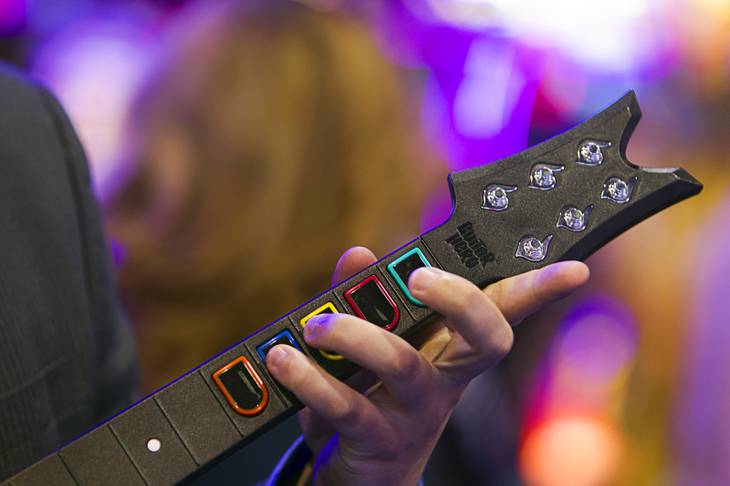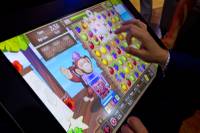Arcade-style gambling machines with video game controllers attached to them.
Casino games that play like “Pac-Man” or a first-person shooter, in which a player’s performance can materially influence the outcome.
A hotel with space devoted to competitive video gaming, and a casino floor that highlights technology geared toward similar customers.
These are some of the ways the Nevada casino industry’s recent focus on arcade and video gamelike technology is beginning to play out in practice.
Gaming regulators encouraged casinos to go in that direction when, per the wishes of the state Legislature, they passed rules last month that laid out a framework for skill-based slot machines. Then, at the annual Global Gaming Expo two weeks ago, gambling technology companies showed off several widely noticed products that emphasize skill and player interaction.
Although multiple companies believe their creations could have been approved under the pre-existing regulations, the new rules and the new products are coming as the casino industry has made a conscious decision to mesh better with another type of gaming — the kind normally found closer to a coffee table than a table game.
Exactly how well the industry’s skill-based gamble will pay off remains to be seen. Nonetheless, a clearer picture of the specific strategies casinos will employ to capture younger and more technologically savvy customers is beginning to emerge.
•••
The Downtown Grand is the most obvious example of how a hotel-casino can take advantage of the skill-based trend.
The Grand, which debuted as a sleek renovation of the Lady Luck a couple of years ago, is challenged by its distance from the heavy foot traffic on Fremont Street. So the hotel-casino needs to work particularly hard at grabbing customers’ attention — and its plan to embrace new types of gambling technology may help it do exactly that.
Eventually, the Grand intends to roll out two kinds of skill games on its casino floor. One will be created by Gamblit Gaming, a company that has been at the forefront of the industry’s conversations about skill-based slot machines. The other will be created by GameCo, a more under-the-radar company that is developing video gamelike casino products.
Additionally, the Grand is considering using space on its property for events related to competitive video gaming, or e-sports.
Part of the idea is to bring in a customer group that casinos across the board are eager to reach: millennials. Generally speaking, resorts have not found as much success with that demographic on the casino floor as they have in nightclubs, bars and entertainment venues.
The average age of Las Vegas visitors has declined in recent years, but so, too, has the percentage of tourists who say they gamble during their visit, according to the Las Vegas Convention and Visitors Authority. Although slot revenue remains a critical component of Nevada gaming revenue, particularly away from the Strip, it is still far below its peak, data from the state Gaming Control Board show.
As much as the Grand is responding to those trends, however, it also wants to remain appealing to traditional gamblers. To that end, the casino has recently instituted a new tiered rewards program and kicked off a $250,000 slot tournament.
“We want to be competitive — we want to attract the current core base of customers that other casinos have as well,” said Jim Simms, the Grand’s new chief executive, in a recent interview. “But there’s also been a trend where slot play has kind of been declining lately. … We’re looking at building a model here that is going be a little more technology-savvy, maybe more cutting-edge than some of our competition.”
Simms’ predecessor, Seth Schorr, remains chairman of the Grand, and he’s also on the board of GameCo. Schorr said the hotel-casino’s current focus is “first and foremost” on the needs of its slot customers. At the same time, he said the Grand is also hoping to grow its customer base.
“As a young casino operator, as a Nevadan, I feel it’s my duty to keep Nevada relevant by making gaming more relevant to a younger demographic,” Schorr said.
•••
GameCo is one of a few smaller companies that is trying to merge video games with gambling in a big way.
Its products include a device that resembles a slot machine cabinet with a video game controller plugged in, as well as two games: a first-person shooter and a racing contest. In the former game, the return on a wager depends on how many enemies a player is able to defeat; in the latter, it depends on how fast the player is able to complete a race.
They’re among the products that diverge most significantly from the traditional format of casino games, but they’re not the only ones. Gamblit, for example, has made a game called “Smoothie Blast” that requires players to match kinds of fruit — similar to “Candy Crush” — to fill a virtual blender, the contents of which determine payouts. Another Gamblit game, “Grab Poker,” challenges groups of players to build a winning hand by competing to grab cards as they rapidly appear on an electronic tabletop.
Additionally, one of the products shown at the gaming expo by G2 Game Design and Next Gaming was similar to “Guitar Hero,” providing players the opportunity to win each time they hit a note in a song. And Nanotech Gaming’s “CasinoKat” is like a version of “Pac-Man” in which players’ skill at conquering a maze chase game can affect their payouts.
Bigger businesses are getting in on skill-based games, too. Slot machine giants Scientific Games Corp. and International Game Technology PLC showed products at the gaming expo in which gamblers can play a round of “Space Invaders” or pinball during bonus rounds.
But experimenting with specific skill-based offerings is just one piece of the puzzle. Casinos, the Grand included, will also need to determine how best to display the new games — and market them to a new audience.
Blaine Graboyes, GameCo’s chief executive, said casinos’ new approach should go beyond appealing to young people in general and target video gamers in particular. And in order to successfully reach those customers, casinos will need to create an experience that they can genuinely identify with, he said.
“Gamers have a very acute nose for inauthenticity, and so what won’t work very well is for a casino to just put these machines on the floor and start bombarding young people with advertising around it,” Graboyes said. “You need to be able to communicate with them on the platforms that they’re used to communicating on, like Twitch and Reddit and Twitter. You need to have a message to them that is authentic in terms of the brands that are involved and the game publishers that are involved.”
Similarly, Nanotech Gaming president Aaron Hightower suggested that the casino industry cannot stick with products that only offer what he described as “the illusion of skill.”
His company’s “CasinoKat” game aims to provide no illusion: It lets players choose the degree to which the outcome of their game will be based on skill, within a certain range.
•••
The emerging arcade-like gambling products are not about to eradicate traditional slot machines anytime soon.
In the wake of the gaming expo, a report from Eilers Research, which analyzes the slot machine industry, noted that the skill category had made a relatively minor splash in the grand scheme of things. Most of the games on display were still in line with the traditional conception of a slot machine.
“Almost all of the major vendors had a couple games focused on the skill-based category given recent regulatory approvals in (Nevada) and (New Jersey),” the report said. “However, nothing really jumped out and we suspect next year there will be more focus on this category.”
The report did not anticipate skill games having any effect on demand in the short-term.
Nonetheless, the industry’s approach to skill is opening up a new realm of possibilities for the future. Graboyes, for instance, said he could envision a casino branded entirely around video games one day.
“You’ll have some traditional games like slots and table games and that kind of thing, but the idea is to build a venue that is specifically designed to attract and retain (video gamers) — give them a home, where they don’t have one right now,” he said.


